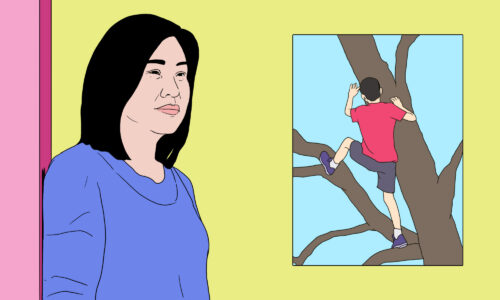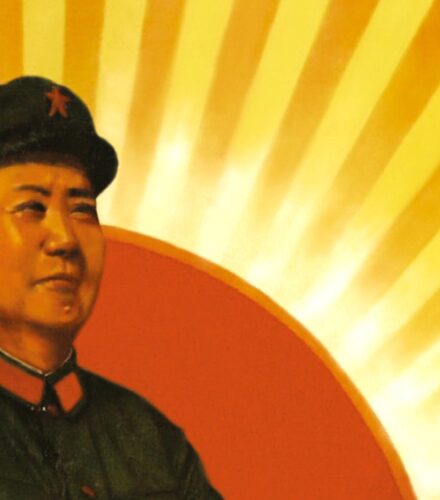Beijing Sprawl
In this collection of nine interconnected short stories, characters are constantly moving without really going anywhere.

Cliché is generally considered toxic in writing, but Beijing Sprawl, a newly translated collection of connected stories, embraces it. Author Xú Zéchén 徐则臣 packs an entire book with storylines that echo, and although each piece has its own tragic, unexpected twist, they follow a similar structure as Xu features fragments of young migrants’ lives on the periphery of Beijing. It seems the resemblance is exactly Xu’s intention: For a book about urban migrants hoping to eclipse the tired rhythms of their own daily lives, the repetition comes across as a literary choice.
The connected stories unfold with a looping circularity that made me feel disoriented and déjà vu at the same time. The same images keep appearing: roasted yams, donkey meat, birds flying overhead. The book’s nine stories riff off one another, and their repetitive form gets at the frustrating contradiction inherent in Xu’s characters’ lives: one of constant motion and social immobility.
Muyu, an anxious 17-year-old who dropped out of high school and jogs incessantly to stave off his “weak nerves,” narrates each story. He has moved to Beijing to help an uncle post advertisements for his fake-ID business and pursue a vague but grand vision of something bigger. Muyu lives in tight quarters with roommates from his same village in Zhejiang Province who have only finished middle school, Xingjian and Miluo. Big talkers (and time wasters), the bro-y duo have also landed in Beijing wanting something more — they just don’t know exactly what. The three are joined by a rotating cast of other Beijing transplants, including a pigeon herder, a subway busker, and other young migrants, whom they recruit to defray the cost of their rented room on the very western outskirts of Beijing. Many are in and out as they make ends meet in the informal economy.
In most stories, Muyu recounts how an interesting figure in the book’s fragmented supporting cast supplements the typical substance of their days, which includes work posting thousands of advertisements and idle time bonding on the roof of their single-story flat with donkey burgers, beer, and card games. Xu plays with the mundane and the extraordinary, folding absurdity into their otherwise monotonous lives. By the end of the collection, you come to expect sad endings. A dog improbably causes a three-wheeler to overturn, squashing a child to death.
During a brawl born out of boredom, one migrant dies after falling on a garden hoe and slashing his carotid artery. Another is killed with a concrete block during a phone-booth altercation.
Egg-crepe vendors with a young boy are suddenly evicted, their small rental demolished as officials clean up “urban psoriasis.”
Tragedy and monotony coexist for Muyu, a keen witness who often finds himself engrossed in the side quests and side hustles that occupy migrant friends he encounters. In “On the Rooftop,” Muyu’s original roommate, Baolai, accompanies him on runs, hoping to glimpse an anonymous girl through the window of a bar.
“Our lives were so monotonous. Apart from the cops, money, abstract ideas of struggle and ambition, and the steadily growing homesickness, Sitting Upright Girl was the most important thing in our lives, Baolai and me…My nerves were still weak. Baolai was still a moron. We worked, slept, played cards, talked in theoretical terms about women and our dreams. We ran faster and faster.”
“Everyone in the whole country knew that opportunity here was like birdshit — it would spatter on your head while you weren’t looking and make you rich. From what I’d seen, however, there were fewer and fewer birds in Beijing.”
Characters are constantly moving without really going anywhere. For one, Muyu is always jogging, the activity that opens the book on its first page. He convinces an old friend struggling with a recurring nightmare (imagining himself as a chained monkey wearing a suit, the friend feels like he’s suffocating after his handler leads him through somersaults, cycling, juggling, and other tricks) to start running. The friend joins, but runs in a tie so he can make the bus in time for his job in retail.
The roommates’ work is also Sisyphean: They spend most nights Sharpie-ing short ads for fake-ID middlemen onto physical pieces of the Beijing streetscape, only for sanitation workers to erase them in the morning. In a separate brief appearance, a trishaw driver dreams he is stranded in mid-air, pedaling without moving. Though perhaps unintentionally, the meaningless exertion recalls the Chinese term for involution (内卷 nèi juǎn), a buzzword that spread on social media among urban, overworked white-collar tech professionals during the pandemic.
Stories in Beijing Sprawl are set before the smartphone became ubiquitous in China; Muyu communicates with a pager. But this translation, by the duo of Jeremy Tiang and Eric Abrahamsen, arrives as current Chinese young adults are encountering some of the same issues that keep Beijing Sprawl’s characters stuck in place. In this decade, rather than pasting fake-ID ads, I imagine Muyu, Xingjian, and Miluo might work as delivery workers for platforms like Meituan and Ele.me. The country’s labor force is slowly shrinking, and good job opportunities — even for college grads in major cities — are not easy to land. In April, China’s youth unemployment rate surpassed 20 percent. Kong Yiji, a Lǔ Xùn 鲁迅 short-story character from 1919 who is a failed, poor scholar, has experienced an online revival this spring, likened to today’s fresh graduates. Beijing Sprawl hints at this shift. “We young men (even counting me, a high school dropout) viewed this vast and bustling capital with boundless expectation,” Muyu notes. “Everyone in the whole country knew that opportunity here was like birdshit — it would spatter on your head while you weren’t looking and make you rich. From what I’d seen, however, there were fewer and fewer birds in Beijing.”
In recent years, some younger workers have simply rejected the pressure and long hours they generally must withstand to achieve upward mobility in China’s expensive, competitive urban centers. Deciding to “lie flat” (躺平 tǎng píng), they essentially opt out of high-pressure, big-city living that revolves around work. In Xu’s collection, bespectacled Tianxiu, intelligent but unable to test into college, recounts one night of exhaustion next to a river in Wuhan, where he grew overwhelmed by the number of migrants he saw drawn to the city: “A wave splashed all the way up to my neck, and I still couldn’t be bothered to move. I’d gotten wet, so what. Darkness fell and a cold wind came along, but I just sat there shivering.”
Xu was born in 1978 and is a Beijing transplant himself: He grew up in the Jiangsu Province countryside near China’s eastern coast before attending Peking University for graduate school. He has long been interested in the characters he reintroduces in Beijing Sprawl, versions of whom have appeared in his other stories. Much of his writing has concentrated on the lives of Beijing’s “floating” migrants (京漂 jīng piào), and Xu has said he writes about people who live between “the sunshine and the shadow” in the capital.
His novel Running Through Beijing, originally published in 2008 and translated into English by Eric Abrahamsen in 2014, follows a migrant who emerges from a prison stint for selling fake documents and begins crisscrossing Beijing peddling pirated DVDs. He, too, runs and runs, delivering DVDs, evading the authorities, and trying to “make it” in the city, but struggles to achieve any upward movement. The novel’s protagonist has a stronger voice and a bigger personality than Beijing Sprawl’s Muyu, who is younger and more observant. But both quickly become aware of all that separates mobility from mere movement.






